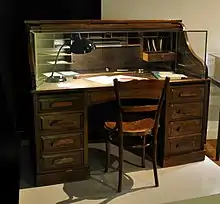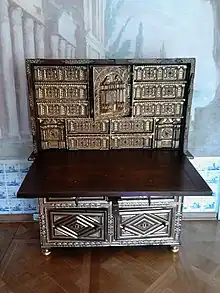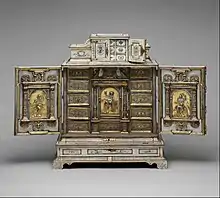Schreibtisch
German

ein Schreibtisch

Spanish vargueño desk

Augsburg Kabinettschrank with drawers
Etymology
From schreiben (“to write”) + Tisch (“table”). Equivalent to Luxembourgish Schreifdësch, Hunsrik Schreibdisch. Both components are ultimately from Latin.
Pronunciation
- IPA(key): /ˈʃʁaɪ̯pˌtɪʃ/
audio (file) audio (file)
Noun
Schreibtisch m (strong, genitive Schreibtisches or Schreibtischs, plural Schreibtische)
Usage notes
- The term schreibtisch was used in 16th and 17th century for cabinets (in german Kabinett or Kabinettschrank). This naming comes from original purpose of cabinets used for writing and storing the papers, so called Bargueño desks). These cabinets were often provided with an openable front panel, used for writing, which hides several drawers for storing the papers or utentils inside. Bargueño desks were copied in other parts of Europe and produced in several forms. Many of them were not even equipped with the writing desk, however the term schreibtisch was used for them.
Declension
Declension of Schreibtisch [masculine, strong]
| singular | plural | ||||
|---|---|---|---|---|---|
| indef. | def. | noun | def. | noun | |
| nominative | ein | der | Schreibtisch | die | Schreibtische |
| genitive | eines | des | Schreibtisches, Schreibtischs | der | Schreibtische |
| dative | einem | dem | Schreibtisch, Schreibtische1 | den | Schreibtischen |
| accusative | einen | den | Schreibtisch | die | Schreibtische |
1Now rare, see notes.
Derived terms
- Schreibtischlampe
- Schreibtischsessel
- Schreibtischtäter
- Schreibtischverbrechen
- Schreibtischverbrecher
Further reading
- “Schreibtisch” in Digitales Wörterbuch der deutschen Sprache
- “Schreibtisch” in Uni Leipzig: Wortschatz-Lexikon
- “Schreibtisch” in Duden online
 Schreibtisch on the German Wikipedia.Wikipedia de
Schreibtisch on the German Wikipedia.Wikipedia de- Spenle, Virginie (2011) “Der Kabinettschrank und seine Bedeutung für die Kunst- und Wunderkammer des 17. Jahrhunderts”, in Möbel als Medien. Beiträge zu einer Kulturgeschichte der Dinge, Bielefeld: Transcript Verlag, pages 69-83
This article is issued from Wiktionary. The text is licensed under Creative Commons - Attribution - Sharealike. Additional terms may apply for the media files.